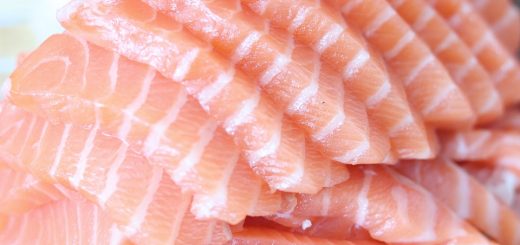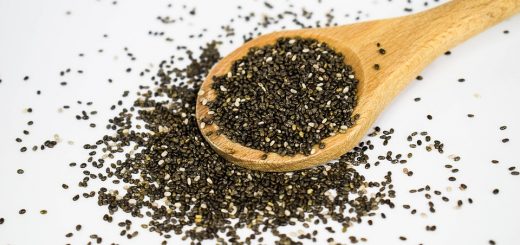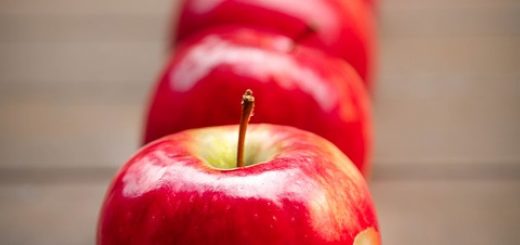23 Kale Health Benefits
Everyone knows of kale, but not many people actually know what kind of food it is or why you should eat it. Kale, simply put, is a leafy green that is related other leafy greens such as broccoli and brussels sprouts. Like other leafy greens, kale health benefits are famous for improving all sorts of ailments.
Kale Fun Facts
- Kale is in the cabbage family
- While usually green, kale can also be purple
- It is grown all over the world because it does well with colder and warmer climates
- Kale is one of the oldest veggies around.
- It was first grown roughly 4,000 years ago in Asia Minor and the Mediterranean
- It did not come to America until the 1600s
- Kale was grown in France on the roadsides as a type of decor
- Italy, Sweden, Ireland, Germany, America, England, The Netherlands, and Scotland all grow kale.
- Different kinds of kale were made (or discovered) in the 1980s by a man named Tim Peters had started to experiment with cross-pollination by using bees
- Greek and Romans used kale to treat drunkenness
Kale Health Benefits
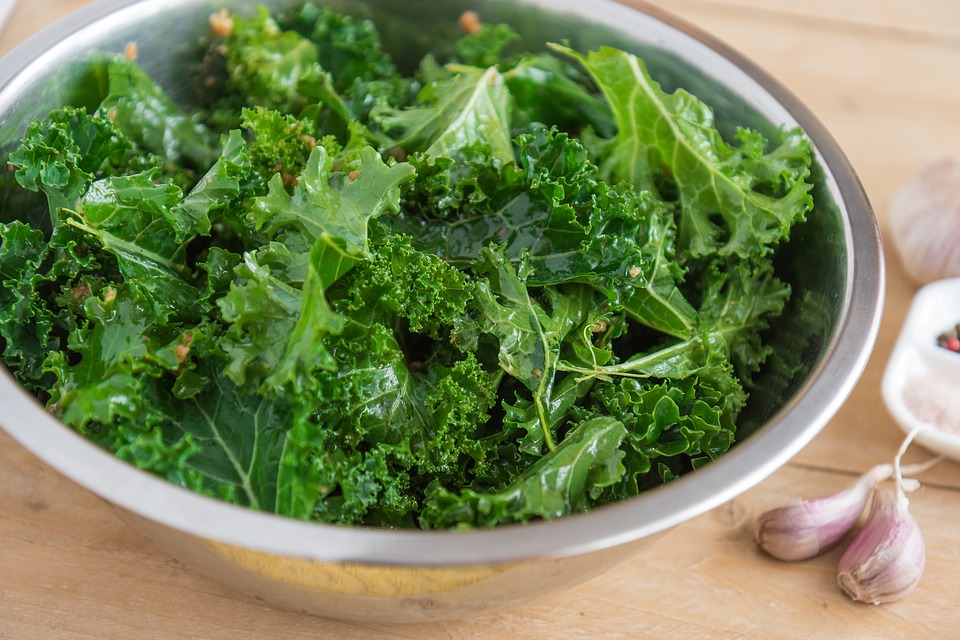
Kale can be eaten in salads, wraps, and sandwiches
-
Antioxidants
Kale is very powerful when it comes to different kinds of antioxidants. It also has quercetin and kaempferol (both are flavonols) as well as two different kinds of carotenoids. These antioxidants can protect your body from common colds and cases of flu, free radicals that can cause cancer, COPD (chronic obstructive pulmonary disease), glaucoma, and cataracts.
-
Cancer-Fighting
Cancer is not only fought by the antioxidants when it comes to kale. Kale also has indole-3-carbinol and sulforaphane, both of which aid in the stopping of cancer growth. Between the antioxidants and these two compounds, kale might be just the thing you need when trying to keep cancer at bay.
-
Losing Weight
Kale has lots of fiber in it which in itself can promote healthy weight loss. This plant is also quite low in calories. So you can eat a good amount of kale in a salad or in other snacks without having to worry about adding on weight.

Other leafy greens, like iceberg lettuce, are also low in calories
-
Heart Health
Anti-inflammatories and antioxidants are both very important when it comes to keeping your heart in the best shape it can be in. Kale has both. So the plant can help the arteries from becoming blocked, can improve circulation, and can help to keep cholesterol levels where they should be.
-
Nutrients
Kale is considered one of the healthiest plants that you can because of the sheer amount of minerals and vitamins that you can get from even just a single raw cup. You get magnesium and manganese; omega-3 fatty acids, vitamins B6, K, B3, A, B2, and C; calcium, potassium, and copper. In the same cup, you also gain three grams of protein, 33 calories, six carbs.
-
Vitamin C
Why is vitamin C so important? Vitamin C is antioxidant that has a great number of different purposes in the human body. It helps to fight off illnesses but it is also needed to make collagen which. Collagen is a protein that is responsible for a lot of functions and structures in your body.
To put the amount of vitamin C in kale into proportion. it had four and a half times as much as a serving of spinach. Kale even has more vitamin C than a whole orange.
-
Vitamin K
Vitamin K, or K1 in kale, is important with binding calcium, fighting osteoporosis, blood clotting, and stopping heart diseases. Like with vitamin C, kale is packed with vitamin K. One cup of raw kale has about seven-time as much vitamin K as you are recommended to have in a day.

Most leafy greens, like spinach, are high in vitamin K
-
Beta-Carotene
A lot of people say that kale is extremely high in vitamin A. That is not totally true. Kale is high in beta-carotene which is an antioxidant that body can use to make vitamin A. While kale does not have that high of a count in vitamin A itself, it can absolutely add the amount of the vitamin A that you have in your body.
-
Eye Protection
Cataracts and macular degeneration are two of the most common eyes issues that people come across. Luckily enough, kale can help to ward off both of them. Kale can do this because it contains zeaxanthin and lutein. They are both work together with carotenoid antioxidants to keep your eyes strong and healthy.
-
Iron
Iron is greatly important for the human body and having anemia (an iron deficiency) can really mess with bodily functions. When looking at the nutrition of kale by calorie, this plant has more iron in it than beef does.
Iron is needed to aid in cycling oxygen through the body, keeping your liver strong and healthy, forming enzymes and cells as well as hemoglobin.
-
Digestion
Kale has a good amount of fiber in it and the stems of kale have even more prebiotics. The fiber and prebiotics can do amazing things for keeping constipation and other stomach troubles at bay.
Kale stems are rather tough when raw, but you can cook them in olive or avocado oil and add in some sea salt to have a nice dip or topping for breadsticks or salads.
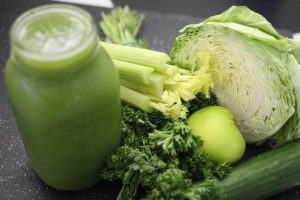
Try adding kale to a smoothie to take in its nutrients
-
Calcium
Calcium helps the body to build bones and keeping them strong, it helps blood through the body, and aids in cell signaling in the nerves and muscles. Kale is an excellent source of calcium considering it has more than milk. Calcium also assists in clotting blood, protecting and repairing DNA, and keep your teeth strong and healthy.
-
Anti-Inflammatory
Inflammation is for a number of reasons. Inflammation can cause pain, heart troubles, swelling, it can keep your body from healing from colds and flu, it can limit motion of joints, and it can cause troubles in the brain. Luckily, the omega-3 fatty acids and vitamin K that were mentioned work together to keep the body’s overall inflammation down.
-
Detox
One of the components in kale is ITCs (isothiocyanates) made from glucosinolates. The ITCs in the body get rid of free radicals and toxins that are in your body. The toxins can be from a pollutant, prescription or over-the-counter-drugs, processed foods, or pesticides; they can all cause health problems and kale can get rid of them all. In the truth, the ITCs work together with the antioxidants. The antioxidants break up the free radicals or the toxins and the ITCs help the pieces to find an exit more quickly if they do not just destroy them the rest of the way.
-
Healthy Brains
Folate is vital for the development of a baby while in the womb. Kale has plenty of folates and therefore is perfect for any pregnant mother. When the mother of a growing fetus eats kale, it helps both the mother and the baby from suffering things like Epilepsy, mood swings, trouble with sleep and focus, and vitamin B12 deficiencies. Aside from that, kale also helps the baby’s heart and face to develop correctly and for the baby to be born within a healthy weight.

Asparagus is also high in folate
-
Skin Health
The impressive amount of vitamin C in kale has been talked about. Not only can it fight off colds and the like, but it can also keep your skin healthy and stop it from aging prematurely. Vitamin C can do this because it plays a major part in making collagen. The collagen, in turn, keeps the skin from gaining age spots, wrinkles, and stops it from sagging.
-
Diabetes
Kale is an exceptional snack or meal choice for diabetics. Kale is low in carbs but high in other nutrients, it does not have sugar, and it has loads of fiber. The mention of fiber is very important because fiber greatly helps to reduce just how quickly the blood absorbs glucose which can help to keep blood sugar reads lower and healthy.
-
Stomach Ulcers
Most stomach ulcers are caused by a kind of bacteria called H-pylori. The H-pylori eats away at the stomach walls which then allows the ulcers to form. However, kale can protect your stomach walls because of the glucosinolate and antioxidants that it contains.
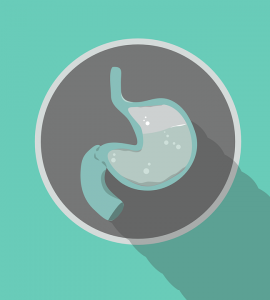
Stomach ulcers are also known as peptic ulcers
-
Vitamin B6
Vitamin B6 is remarkable in all of the things that it can do. Getting enough vitamin B6 reduces the severity of morning sickness; lessens chances for different cancers; helps your body to work with fats, proteins, and carbs; and reduces the chances of age-related cognitive declines.
It should be noted however that too much vitamin B6 can also do damage. It can cause digestive troubles, skin lesions, neurological troubles, and photosensitivity.
-
Manganese
Manganese is a trace mineral that is grossly unmindered in its importance. This mineral helps iwith calcium absorption, making connective tissue, clotting blood, producing sex hormones, regulating metabolism, and helping the brain and nerves to function.
-
Potassium
Most Americans, on average, do not get nearly enough potassium in their diets. Kale can really help with that count considering that a single chopped cup of kale has 299 mg of potassium in it. Potassium is so important because it keeps away kidney stones, regulates blood pressure, stops bone loss, and lessens the chances of heart diseases and strokes.
-
Magnesium
Kale has a good amount of magnesium which is fantastic seeing as it is another trace mineral that people do not take seriously enough. Magnesium converts vitamin D so it can take care of calcium, it helps with digestion, keeping the calcium levels balanced, it can destress, and it can also help to balance brain chemicals to calm ADD, ADHD, and dyslexia.
-
Depression
Kale is being used as a way to help treat depression in a couple of different ways. Kale has omega-3 and something called phytonutrients molecules. These phytonutrients molecules then turn into carotenoids and the carotenoids work together with the omega-3 to battle out depression.
On top of that, kale also contains iron, vitamin B6, folate, and protein all of which help to make dopamine and serotonin which are two chemicals that can help you to feel happy.

Eating more kale can also help to prevent and fight anxiety
Will you begin to eat more kale now that you know about all of its health benefits? Comment below!
Sources
https://www.well-beingsecrets.com/health-benefits-of-kale/#History_Of_Kale
https://legionathletics.com/health-benefits-of-kale/
https://www.authoritydiet.com/why-kale-good-you-health-benefits-nutrition-facts/
https://www.naturalfoodseries.com/13-health-benefits-kale/
http://www.whfoods.com/genpage.php?tname=foodspice&dbid=38
https://www.mindbodygreen.com/0-4408/Eating-Kale-Top-10-Health-Benefits.html
https://www.healthline.com/nutrition/10-proven-benefits-of-kale#section2
http://www.thekaleproject.com/simple-faqs/where-does-kale-come-from/
http://www.thekaleproject.com/simple-faqs/whats-the-history-of-kale/

